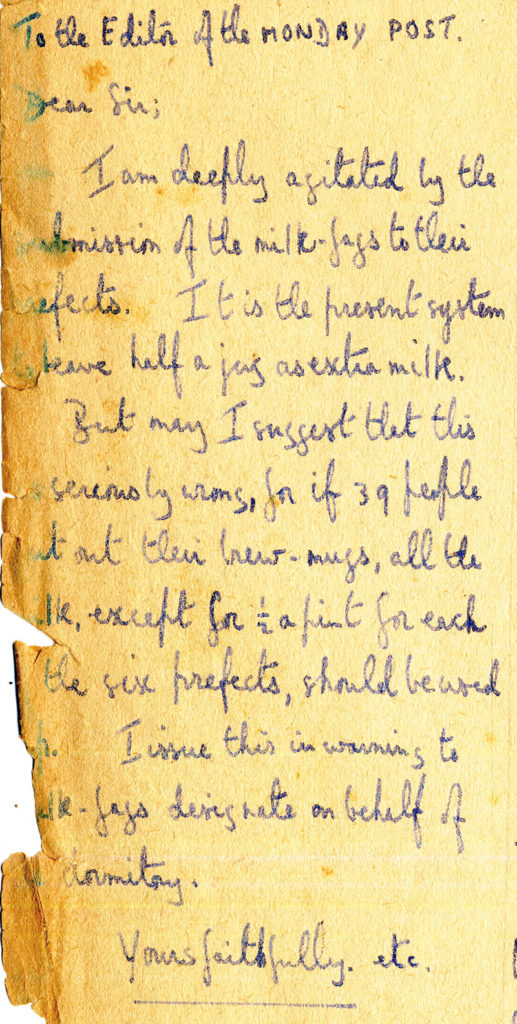Fagging
Fagging – the allocation of various menial duties to younger students by older ones – was universal at Wellington, as at most other similar schools, during the 1940s and 1950s. Only one respondent, Tim Reeder (Picton 1949–53), replied that ‘As a Scholar I was excused fagging.’ Everyone else had served as a fag, although only those who made it to the rank of Dormitory or College Prefect had the privilege of commanding a fag themselves.
NOTE: We are aware that the terms ‘fag’ and ‘fagging’ are now considered derogatory or possible homophobic slurs, and that their use may now be offensive. Throughout this website we use the terms as they were used at Wellington College in the past, deriving from ‘fag’ as a slang term for tiring or tedious work, and with no derogatory or homophobic connotations.
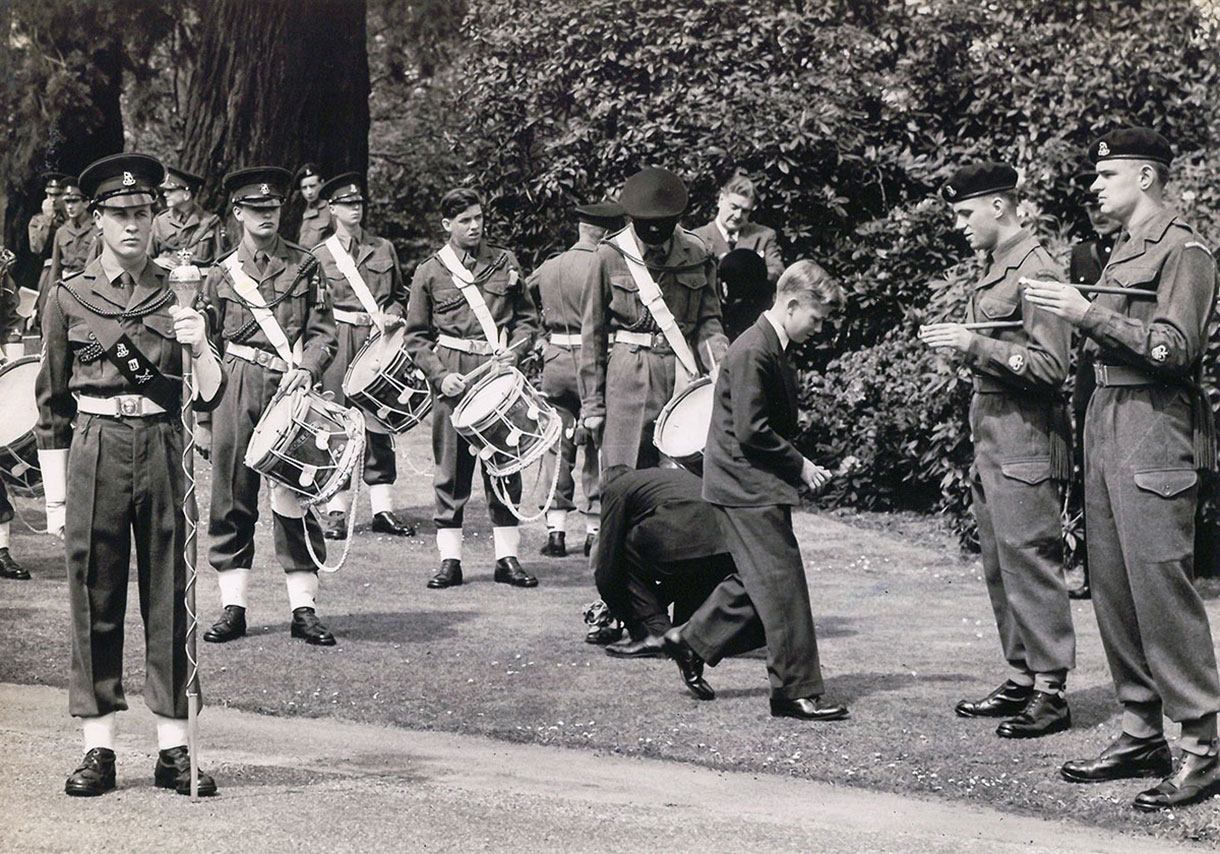
The fags’ exam
A large number of respondents described the fags’ exam, a test of knowledge to which all new boys were subjected around three weeks into their school career:
‘Once in Dormitory, the first three weeks were dedicated to learning the geography of the College, some local traditions and practices, and also some things that were completely useless such as “How many pineapples are there?” (fourteen, I think, but I may be wrong.) During this period you were looked after by a more experienced fag who taught you the ropes and where things were located, such as noticeboards. Once the three weeks were up, you had to take and pass the Fags’ exam.’ Chris Heath (Beresford 1948–53)
‘Essentials included the names of the Tutors and Heads of all the dormitories and houses and the whereabouts of the various buildings and playing fields. There was quite a lot of less important stuff also: e.g. the height of the Golden Pineapple!’ Christopher Stephenson (Hill 1949–54)
‘The wide range of questions made it quite hard: we had to know where remote buildings were, when Grubbies was open; who was Head of School, Captain and members of the rugger XV; Tutors’ and ushers’ positions, nicknames, special interests and characteristics! It lasted about forty minutes and, astonishingly, some failed.’ Robert Waight (Orange 1942–46)
The exam itself generally consisted of a verbal questioning by the Prefects on the appointed day.
‘Then the exam with its trick question, “Where does the Path of Duty lead?” To Grubbies, the tuck shop, not “The Way to Glory” as inscribed over the gate.’
Pat Stacpoole (Combermere 1944–48)
‘The only question which I can now remember is that one was given a list of all the ushers’ nicknames, which one was expected to know off by heart. My House Tutor was “Nosey” Evans because he had a very prominent nose. (Easy and obvious, that one.) Major Roy, who commanded the Corps, had lost an eye (we never knew, but assumed, during the War) was very unkindly known as “Dead-eye Dick”, or “The Constipated Bulldog”, while, as mentioned previously, Mr. Crawley was “Anthony Sebastian”. Those are the only ones I can now recall – no, one more, Mr. Travers (he was an Australian, and an Australian rugby international, I think only at College for a year or so) was “Jiker” – no, I don’t know, either.’ Alastair Wilson (Talbot 1948–1950)
‘When researching this narrative I dug out my Blue Roll for the Michaelmas Term 1957. On page 4 where the Academic Staff is listed are my pencil annotations giving the nicknames of the majority of the teachers.’ Richard May-Hill (Hopetoun 1957–61)
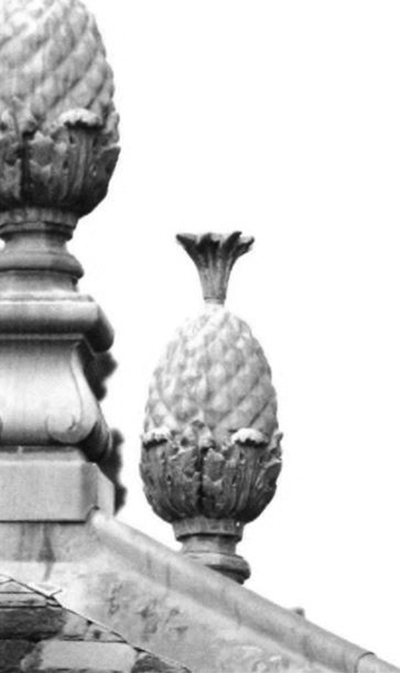
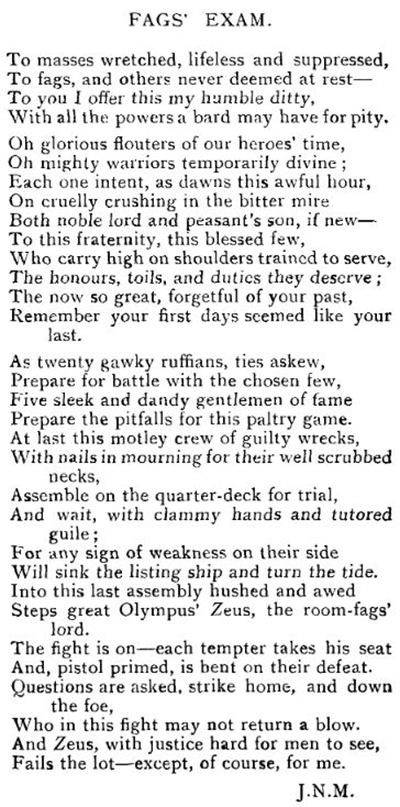
Several remembered the consequences of failure in the fags exam:
‘This was the first exam you faced within College and was taken very seriously, not just by yourself but also by your Fag Teacher. Failure carried a stigma and could have long term consequences for weeks to come.’ Richard Craven (Hill 1950–54)
‘If you failed, you had to take it again a week later. If you failed a second time, I think there was a risk that you might get beaten.’ Chris Heath (Beresford 1948–53)
‘If you passed – huge relief for you and your fag teacher. If you failed, you had to stand up on a raised shelf and sing a song (subject to some abuse). You were given a further week to “swot up” and be re-examined. What an ordeal! I was fortunate to pass my own exam first time, but my designated fag failed first time, but after shutting him in an under-eaves cupboard and forcing him to learn all the necessary facts whilst I sat outside and shouted out the Q & As, he, or should I say we, passed the second time!’ Tony Glyn-Jones (Picton 1954–59)
‘I failed the fags’ exam, which took place a fortnight after one’s first arrival. As a penance, I was compelled to climb onto the bar between the “tishes” on the first floor and sing a song. As I could not remember a single one, a Prefect handed me up a Bible open at the Psalms. Not knowing the tune, I made it up. It was not a pleasing performance.’
Nikolai Tolstoy-Miloslavsky (Stanley 1949–53)
‘The penalty for failure was to stand before the whole dormitory and sing a song whilst being barracked by the audience. Fortunately, I passed but I retain to this day the mental image of some poor boy who had failed crying whilst being mocked as he attempted to sing the song. In my final year when I was a senior boy, we managed to abolish the practice [the punishment, rather than the whole fagging system].’ Richard Merritt (Picton 1954–59)
Duties
Once the exam was passed, fags were expected to serve for around four terms, although occasionally it could be as many as seven.
John Ravenhill (Orange 1953–56) still feels some bitterness about this: ‘I also believe that my achievements could have been greatly improved if I had not been penalised by seven terms as a fag due to my low academic achievements, four terms as head fag whereas my brainy brother only did three terms and was then Prefect at 16. NOT AT ALL FAIR.’
The running fag
‘“Someone!” The call reverberated down the dormitory. First-year boys dropped whatever they were doing and reported to the Prefect making the call. The last past the post got the job. “Anyone!” All including year two had to respond.’ Peter Rickards (Murray 1947–52)
‘At the bottom of the heap was “the running fag”. Whenever a Prefect wanted something to be done, he would call “Fag”. This forced all the fags to drop whatever they were doing and run like hell to get to the Prefect before anybody else. If you were last, you were likely to get the job. Most of these jobs were not all that onerous, mainly requiring you to carry a message from one place to another or check a noticeboard.’ Chris Heath (Beresford 1948–53)
‘I remember one particular group in the Combermere – when they were “squealers” they would try to trip each other up so that the other was the last to arrive and had to do the fag.’ Graham Stephenson (Combermere 1953–57)
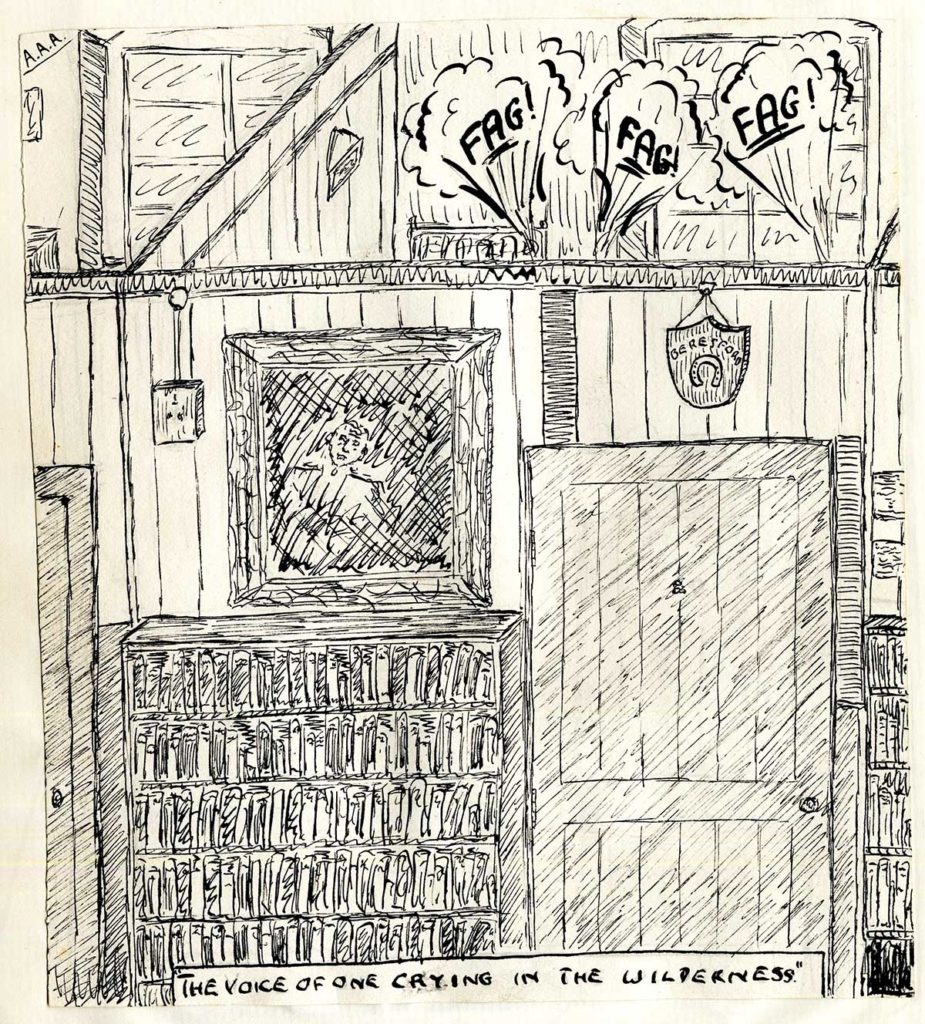
The room fag
After a period as running fag, some would then be allocated as ‘room fags’ to a House or dormitory Prefect:
‘Each Prefect had a room fag, whose job was to make the bed, clean the room, polish shoes and Corps boots and make tea, toast and so forth. The Head of Dormitory for some reason had two room fags.’ Christopher Stephenson (Hill 1949–54)
‘We had to fag for the Prefects for two years, doing jobs such as cleaning Corps kit, running baths for the Prefects, cleaning shoes, making beds etc.’ John Alexander (Talbot 1954–58)
‘One became early-morning tea-maker, boot-polisher, bed-maker, room-tidier, belt-blancoer, toast-maker and general factotum to one of the Dormitory Prefects. My own was Peter Snow of Swingometer fame; a cheerful taskmaster, and I was fortunate – not all were.’ Michael Peck (Anglesey 1954-59)
Some recalled the specific demands made of them:
‘My first stint was to one Cholmeley Messer, who was so tall that folding his trousers involved holding them higher than my head … or so it seemed.’
Peter Gardner (Hardinge 1946–51)
‘My first job was to wash the razor of Eddie Arida, a future water-skiing champion.’ Nick Harding (Combermere 1951–55)
‘I fagged for a chap called Temple; his demands were pretty modest; the only regular task I recall was cleaning some leather sandals (when did he wear those?) with shoe-cream!’ Jeremy Watkins (Blücher 1951–55)
Later, there may have been some restrictions on what a fag should do, as Richard May-Hill (Hopetoun 1957–61) recalled that ‘The only tasks not permitted were cleaning or polishing of CCF equipment.’
One task in particular seems to have passed into College legend, although only one respondent claimed to have experienced it first-hand:
‘Apparently, it had been far worse in the past and I heard that there had been a fag who, one winter had been sent out to sit on a toilet seat to get it warm for a Prefect!’ Chris Heath (Beresford 1948–53)
‘It was alleged that a fag from the Hopetoun or Murray had been sent on a cold winter morning to warm a lavatory seat in what were known as the Murray Heads below that block!’ Henry Beverley (Anglesey 1949–53)
‘I did however consider one task requested of me by a Prefect – to warm the loo seat for him on a cold winter’s morning – a step too far …’ Alan Munro (Talbot 1948–53)
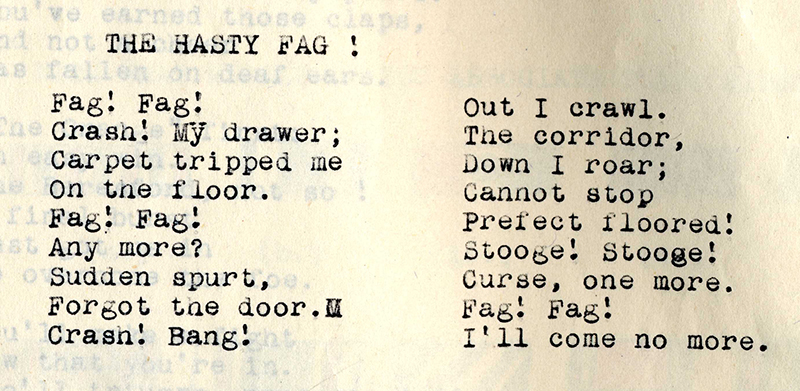
Other duties
There were other specific roles too:
‘One could be the chap who got the milk from the Dining Hall and carried it to the dormitory each day, or the toast fag who had to make toast as required for the Prefects.’ Martin Kinna (Murray 1953–58)
‘At one point I was the Hopetoun bread fag, which involved collecting a large tin filled with freshly-baked and sliced white bread which we ate for supper.’ David Ward (Hopetoun 1954–58)
‘I was the Sixth Room fag and had to clear up after the Prefects’ tea. They liked to leave broken canes [from beatings] on the floor, which I had to dispose of.’ Vernon Phillips (Murray 1951–54)
‘On a rota two fags were made to wash up the Prefects’ dirty crockery and cutlery after lunch each day. This was leftover detritus from the previous evening feast which they were entitled to brew and enjoy after general lights out for the dormitory. Consequently, the residue was well and truly caked-on and difficult to remove with just tepid water and a tatty rag. The Prefects must have built up a colossal immunity to germs!’ Richard May-Hill (Hopetoun 1957–61)
‘In my first term, I had to do duty as a “brew fag,” which meant washing up the Prefects’ coffee cups etc. every morning. I think this function was stopped not long afterwards, because a parent complained about it.’ Anonymous
Sometimes the role was not quite so official, and therefore more resented:
“One group of Prefects thought it a good idea that I made early morning tea for them – one has little idea how nasty one can make a cup of tea if one really sets one’s mind to it.’
John Green (Talbot 1954–58)
The time fag
Many respondents described the vital early morning role of the time fag:
‘One had to arrive in hall before the deadline – 7.45am for breakfast, when the Hall Usher shut the door firmly, whether one was in or out. Each dormitory had a “time fag” whose job it was to call out the time, probably starting from 7am until 19 minutes to 8, when one had to be out, giving just enough time to get to Hall without undue haste. The final countdown was in minutes, interspersed with “Hurry up!”’ Charles Ward (Hopetoun 1951–55)
‘I was time fag, whose job was to shout out the time at regular intervals to get all boys out of dormitory by 7.45 am to get them to breakfast. Doing this for a year instilled in me a sense of punctuality which has stood me in good stead ever since.’
Nigel Hamley (Hill 1952–55)
Accepted or resented?
How was fagging viewed by those who had to do it? Overwhelmingly, our respondents said that at the time it was simply accepted as part of life, and they just ‘got on with it’. Few felt that their seniors had taken unfair advantage of the system.
‘I accepted fagging as part of the modus operandi and did not find it too onerous.’ Nigel Hamley (Hill 1952–55)
‘To me it was just a bore, part of the system and something that had to be endured. Most of the Prefects in the Anglesey were quite reasonable in their demands.’ Jerry Yeoman (Anglesey 1955–59)
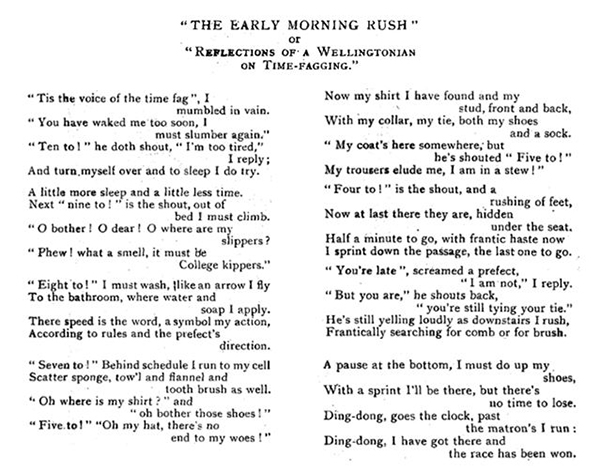
Some were pragmatic and took the long view:
‘Fagging never bothered me because I knew I could benefit later!’
John Alexander (Talbot 1954–58)
While others were simply philosophical:
‘It worked and had to be endured.’
Michael Campbell (Hill 1954–59)
Some even seemed to enjoy it:
‘Fagging was not much of a chore. It was quite fun cooking a Prefect’s scrambled egg (powdered) on the gas ring. Provided it was edible, you normally got a bit. Cleaning one’s hero’s shoes, washing up his tea mugs or taking his insulting messages to mates in other dormitories was educational and exciting fun.’ Robert Waight (Orange 1942–46)
‘If I was busy, I left my “tish” door open and read on a chair so as to be first out of the door, down the corridor to the Head of House – last to arrive was “fag”. If I wasn’t busy (no prep) I was deliberately last to arrive when he called “Fag!”, so I could run messages to other houses or dorms to explore. How else did one learn what life was like in the dorms? It took me three minutes flat out from the Benson to College.’ Robin Lake (Benson 1952–57)
‘If the call went up … it could mean a journey to another dormitory, and thereby I once met a member of the first XI!’ Douglas Miller (Benson 1951–56)
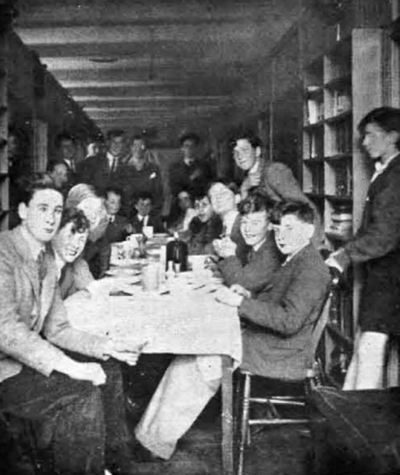
And there were some perks:
‘At the end of each term, “your” Prefect would give you a tip depending on how he thought you had performed. Normally this was about ten shillings. When it came time for the Prefect to leave College, he would give you a financial reward something under five pounds and maybe hand onto you something of his, like his desk, a picture etc.’ Martin Kinna (Murray 1953–58)
‘At the end of term, the Prefects gave the fags a tea party which usually ended in some form of “battle”. The Prefects did not always win! I remember getting a rocket from Rupert Horsley, my Tutor, for allowing things to get out of control in the swimming pool.’ ‘Bobby’ Baddeley (Picton 1948–52)
‘There was a camaraderie amongst fags, and we had a pecking order, toast fag being top of the pile since you got to eat other people’s spreads. (I remember sandwich spread which looked and tasted like vomit)’ Stuart Dowding (Talbot 1957–61)
When our Old Wellingtonians looked back from today’s perspective, opinions were more varied. Some still felt that fagging had been a good system and pointed out that there were good reasons for it at the time. Anthony Bruce (Benson 1951–56) observed that:
‘At that time the senior boys carried much more of the burden of administration than they do today. For example, it was the job of the Captains or Secretaries of all sports to liaise directly with their counterparts in other schools to arrange the next year’s fixture dates, both home and away on alternate years. I also remember as Captain of Athletics having to keep the records of the whole school for the athletics Standards Competition, while the House Prefects had to organise the schedule for all boys in the House on those afternoons allocated for games and other non-classroom activities.’
He therefore felt that it was reasonable for senior boys to receive help with more domestic or menial tasks.
Others made further points in the system’s favour:
‘In the days before mobile phones fags performed a vital communications link in running messages.’ Christopher Stephenson (Hill 1949–54)
‘Leaving prep school as cock of the roost, one was brought back to reality by finding oneself at the call (literally in this case) of one’s elders.’ Hugo White (Hardinge 1944–48)
Several felt that it had prepared them for the experience of having a ‘batman’ when they became Army officers, and perhaps considered that it led them to treat their batman more kindly.
However, there were others who in retrospect, or even at the time, objected. Sometimes this was because of particular tasks or people:
‘It was tedious, especially cleaning filthy cooking vessels, cleaning shoes etc.’ Michael Crumplin (Orange 1956–60)
‘The Prefect I fagged under I had no respect for. It was prejudice on my part, and I feel bad now that I would allow his toast to burn just to annoy him! I did not mind fagging generally.’ Michael Mathew (Murray 1956–60)
But some objected to the system as a whole:
‘Fagging was a form of slavery that everybody had to endure or was allowed to exploit.’ Chris Heath (Beresford 1948–53)
‘Both as a junior and as a senior, I found this system loathsome and old-fashioned.’ John Le Mare (Stanley 1950–55)
‘Fagging taught you nothing except a cheerful rivalry between the fags and some pity for the fatter, slower ones. No tears for its disappearance.’
Andrew Dewar-Durie (Talbot 1953–56)
Perhaps because of this, in the later 1950s there were the first moves to revise or even get rid of the fagging system:
‘I was part of group who felt that aspects of the system of fagging needed to change.’ Richard Merritt (Picton 1954–59)
‘They were being phased out, so far as I recall, even in those days… the Head of House was not pleased when it was decreed that the Head of House fagging post was potentially to be abolished and I took advantage of the fact.’ Stuart Dowding (Talbot 1957–61)
John Ravenhill (Orange 1953–56) even went so far as to claim that ‘on my leaving I petitioned through my parents for fagging to be stopped and it was,’ but in fact, as other accounts show, it was to continue in some form for many years to come.
